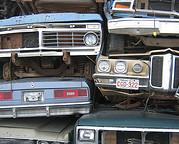 Below are five opinions on why Cash for Clunkers may be bad or harmful to the environment and counter to the original green goals of the program.
Below are five opinions on why Cash for Clunkers may be bad or harmful to the environment and counter to the original green goals of the program.
“Given these easygoing requirements, Chameides told the Greenwire news service that it might take five years before a new car produced a net emissions savings over the clunker you traded in. (You’d be saving money on gas right away, of course, but what’s good for your wallet would be bad for the planet at the outset.) If you got a small truck through the program, it might take a decade’s worth of driving before there was any environmental benefit. Considering that Americans tend to switch cars every 8 to 10 years, that means some new truck trade-ins might never produce any CO2 savings whatsoever.” Continue Reading in Slate.com
By Nina Shen Rastogi, Salte.com
““[T]he act of replacing them entails environmental costs not accounted for in the stimulus programs. Building a new car, washing machine or refrigerator takes energy and resources: The manufacture of steel, aluminum and plastics are energy-intensive processes, and some of the materials used in durable goods, especially plastics, use non-renewable fossil fuels as feedstocks as well as energy sources. Disposing of old products, a step required by most incentive and rebate programs, also has environmental costs: It takes additional energy to shred and recycle metals; plastic components often cannot be recycled and end up as landfill cover; and the engine fluids, refrigerants and other chemicals essential to operating products end up as hazardous wastes. ” Continue Reading in Washington Post
Gwen Ottinger
Writer, Chemical Heritage Foundation
“The program could have subsidized the truly fuel-efficient cars such as the Honda Fit or Civic, the Toyota Prius, or the Dodge Caliber, and any other vehicle that achieved city mileage of at least 25 mpg. Or, it could have included any alt-fuel, alt-propulsion or multi-fuel vehicle such an electric, compressed natural gas (CNG), methanol or other biofuel vehicle regardless of the mileage. The program could have jump-started the mass conversion of oil-burning vehicles to CNG, electric or multi-fuel. Instead, Cash for Clunkers subsidized virtually anything on wheels, including some of the nation’s worst gas guzzlers, vehicles that now rate only a few miles above government mileage designations for highly taxable “gas guzzlers,” which is 15 or 16 mpg. The only requirement is that the new car exceeds the old vehicle’s mileage rating by only two to four mpg. So, some of the worst vehicles in America are now being taxpayer enabled in a recession. This includes the Honda Ridgeline, Honda Pilot, Cadillac SRX, and the 2009 GMC Canyon.” Continue Reading Auto-Channel
Edwin Black
Author “The Plan: How to Save America When the Oil Stops—or the Day Before,”
“When gas prices spiked last year, the MBTA experienced record ridership numbers, an increase of 21 million people over 2007. Estimates suggest that when the cost of travel increases by 10 percent, car traffic decreases by 3 percent. Subsidizing more fuel-efficient cars lowers the gas used for each mile of travel, but it encourages driving and discourages public transit use, car pooling, and living at higher densities close to jobs. Can Congress ever stop supporting sprawl?…We should expect more driving from someone who is induced to buy a newer, more pleasant car that is cheaper to drive. No one should be surprised when the stimulus package’s jolt to highway spending increases driving. Some leaders seem to think that subsidizing high-speed rail will offset this cash for cars, but subsidizing travel means more travel and more carbon emissions. The best way to get people to ride trains is to impose appropriate taxes on carbon and congestion charges.” Continue Reading in Boston Herlad
Edward L. Glaeser,
Harvard University Economics Professor
“We think a much more efficient program would have been to encourage recycled parts usage. All those parts that could have been reused to help out the environment will go right to a scrap processor.” Continue Reading in CBS News
Michael Wilson,
VP Automotive Recyclers Association
Is Cash for Clunkers bad for the environment? Needs changes? Please comment.
Disclaimer: Articles featured on Oregon Report are the creation, responsibility and opinion of the authoring individual or organization which is featured at the top of every article.


